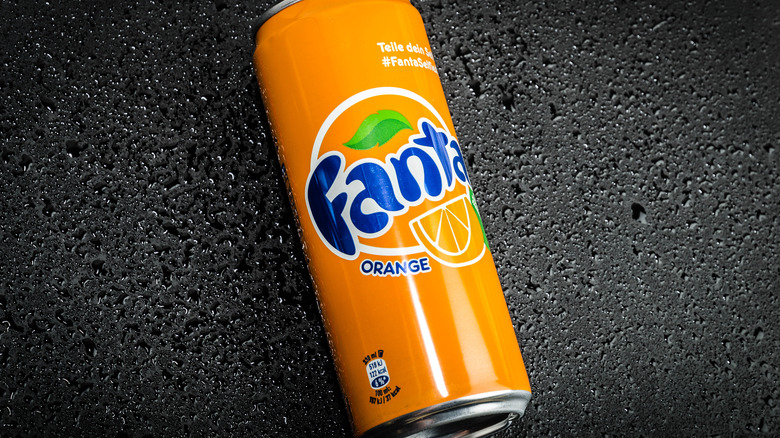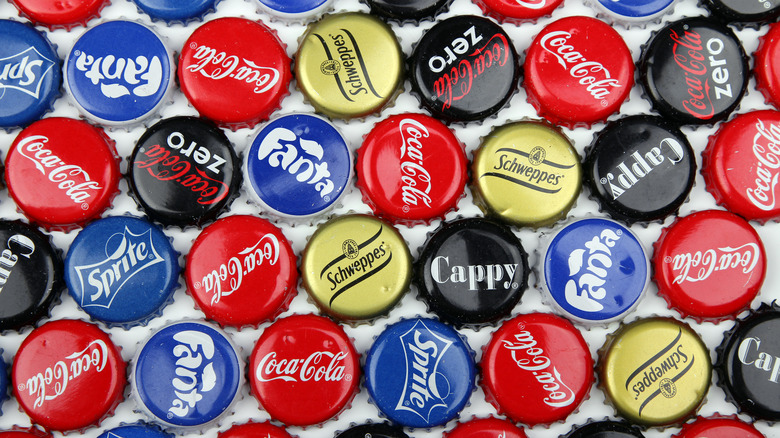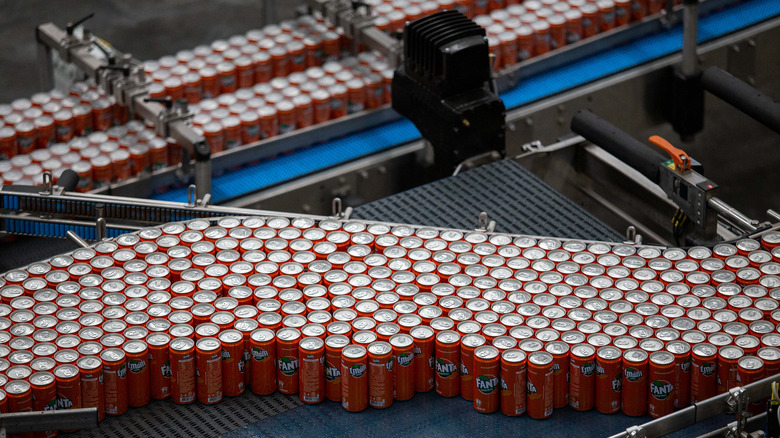Fanta Has A Darker History Than You Might Think
Those who've always known in their soul that Fanta is a cosmic horror beyond description, take heart — you've been right all along. It was written all over the can and its bubbly, sticky innards bestowing the curse of tooth rot. It was there in the "Wanna Fanta? Don't you wanna?" (No, I certainly do not!) commercial that made you grip the sofa arms and beg for a swift death. But perhaps most of all, it was there on the Third Reich officials who alternated between wrapping their lips around the rim of a cold, frosty Fanta bottle during World War II and hailing an evil even more ancient than "naturally flavored" soda. Enter Fanta: A beverage as fascistic in its sugar content as its original drinkers were in their worldview.
Nobody expressly intended for Nazis to be spotted smiling while Sieg Heiling, Fantas in hand. That never happened, anyway. Although an AI-generated picture of Hitler chilling with his bros on a beach with Fanta and vodka is not off the table. As All That's Interesting says, Fanta began as a Coca-Cola alternative in World War II Germany when the hissing river of American Coke stopped flowing. Businessman and Coca-Cola stan Max Keith had taken over Coca-Cola's German division and needed a quick replacement for that sweet, sweet black nectar. And so, he commissioned his corporate chemists to devise a substitute. Thus Fanta was born from the "leftovers of the leftovers," as author Mark Pendergrast said (via Atlas Obscura).
The cheapest of cheap wartime substitutes
Quick: What do you get when you chuck a whole bunch of wartime rations together? As All That's Interesting lists, we're talking beet sugar, whey left over from cheese production, "fruit shavings," and "apple fibers and pulp from cider pressing." Chunk them in a blender, hit "on," and you've got the original recipe for a drink that's not doing too Fanta-stically in the present, judging by Coca-Cola's 2022 Q3 financial report. But even when Fanta hit the German market in the 1940s, it had to contend with the memory of the undisputed king of saccharine beverages — Coca-Cola, itself a drink that had been marketed as "worthy of being consumed by the German people," per All That's Interesting. Salesman Joe Knipp pitched the name "Fanta" — German for "fantasy" — and that was that.
Despite being an inferior beverage, Fanta thrived during wartime because "It was Fanta or nothing," as Atlas Obscura quotes author Tristan Donovan in "Fizz: How Soda Shook Up the World." Coca-Cola GmbH, the company's German division, couldn't replicate Coca-Cola's secret recipe because its American office in Atlanta blocked communication with them and stopped all shipments of the pop to Germany. Fanta, which used ultra-cheap beet sugar, became the only domestic sweet drink around and was even poured into recipes for soup and bread. By 1943, the drink had sold almost 3 million cases and single-handedly saved Coca-Cola GmbH from a sure death.
It's like Coke, but with extra-fascist origins
Back in the pre-Fanta days of 1939, Coca-Cola GmbH chief Max Keith hosted a 10th-anniversary company party where all of his employees lovingly saluted their führer, Adolf Hitler, on his 50th birthday. After that, Keith watched German soldiers carry American-made Coke into occupied German territories in the Netherlands, France, and Italy, all while companies on both sides of the Atlantic made bank. And after the United States joined World War II and embargoed its exports of tasty beverages, Keith simply went through the proper channels to stay in business. Author Mark Pendergrast said that it was simply impossible to do business in Germany without working with the Third Reich, so pervasive was their control.
After World War II ended, Atlas Obscura says that Coca-Cola headquarters back in the United States was so proud of how Keith held Coca-Cola GmbH together that they made him head of Coca-Cola across Europe. Since then, the company has tried to distance itself from such sticky historical connections, starting in 1955 with a complete rebranding of Fanta as an orange soda from Italy. Fast forward some decades and All That's Interesting says that Fanta's 75th-year anniversary in 2015 saw the company criticized for its "Good Old Times" marketing campaign, which some decried as a positive comment about Nazi Germany. But really, such criticisms are the least of Fanta's crimes against beverage consumption.


